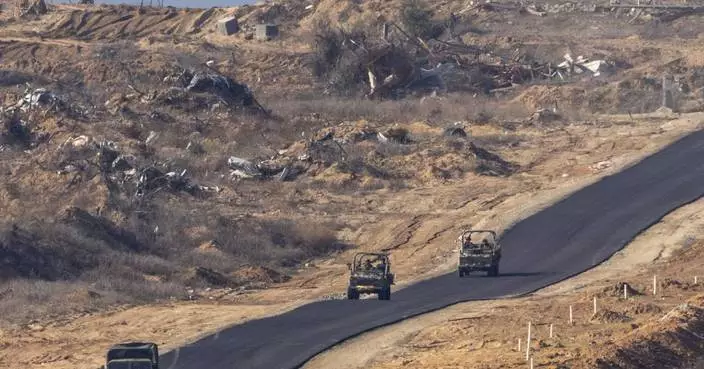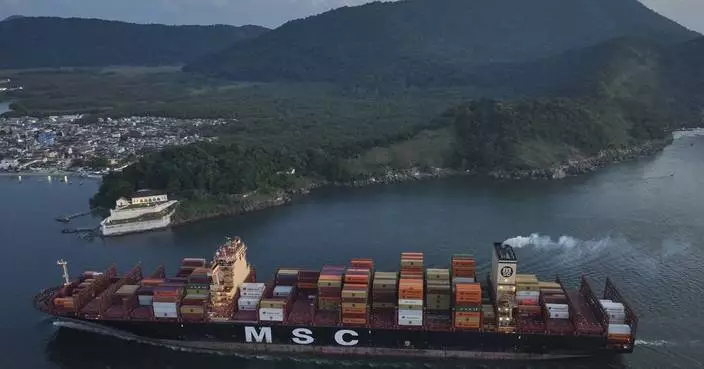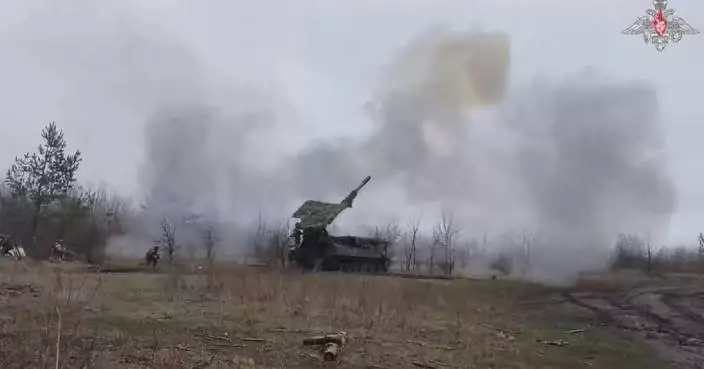The tip of Michigan's mitten struggled through another day without electricity Tuesday as restless residents tried to stay warm while utilities scrambled to restore power in a region waylaid by weekend freezing rain that brought down countless trees and poles.
Schools in several counties were closed again at the top of the Lower Peninsula. Sheriff's deputies armed with chain saws cleared roads and were even delivering oxygen for the homebound. Drivers idled their vehicles in gas station lines that were blocks long.
Click to Gallery
Piper Kuzel, 5, watches her father, Jesse Kuzel of Charlevoix, Mich., fill gas containers at the Ellsworth Farmers Exchange Tuesday, April 1, 2025, in Ellsworth, Mich., as his family has been using heat from their home's natural gas stove to keep warm with power outages widespread following the ice storm. (Jan-Michael Stump/Traverse City Record-Eagle via AP)
Piper Kuzel, 5, watches her father, Jesse Kuzel of Charlevoix, Mich., fill gas containers at the Ellsworth Farmers Exchange Tuesday, April 1, 2025, in Ellsworth, Mich., as his family has been using heat from their home's natural gas stove to keep warm with power outages widespread following the ice storm. (Jan-Michael Stump/Traverse City Record-Eagle via AP)
Sgt. Mitch Wallin of the Emmet County Sheriff's Department walks past ice-coated trees as he and Sgt. Tyler Midyett, not pictured, clear branches from along Eppler Road in Petoskey, Mich, Tuesday, April 1, 2025, as cleanup from the weekend's ice storm continues. (Jan-Michael Stump/Traverse City Record-Eagle via AP)
A crew from 5H Irrigation and Maintenance clears downed limbs from yards in Petoskey, Mich., Tuesday, April 1, 2025, as clean up from the weekend's ice storms continues across northern lower Michigan. (Jan-Michael Stump/Traverse City Record-Eagle via AP)
An Antrim County Road Commission crew clears branches and trees hanging near Atwood Road from ice build up Tuesday, April 1, 2025, near Ellsworth, Mich., following weekend storms that deposited as much as one inch of ice over areas of northern lower Michigan. (Jan-Michael Stump/Traverse City Record-Eagle via AP)
Sgt. Tyler Midyett of the Emmet County Sheriff's Department works along with Sgt. Mitch Wallin, not pictured, to clear fallen trees from along Eppler Road in Petoskey, Mich., Tuesday, April 1, 2025, as cleanup from the weekend's ice storm continues. (Jan-Michael Stump/Traverse City Record-Eagle via AP)
Debris and ice-covered trees cover Curtisville Road that turns into Ausable Valley River Road in Oscoda County, Mich. on Tuesday, April 1, 2025. (Kaytie Boomer /The Bay City Times via AP)
This aerial view shows ice-covered trees off of Eggleston Road and Curtisville Road in Oscoda County, Mich. on Tuesday, April 1, 2025. (Kaytie Boomer /The Bay City Times via AP)
This aerial view shows ice-covered trees off of Eggleston Road and Curtisville Road in Oscoda County, Mich. on Tuesday, April 1, 2025. (Kaytie Boomer /The Bay City Times via AP)
Debris and ice-covered trees cover Curtisville Road that turns into Ausable Valley River Road in Oscoda County, Mich. on Tuesday, April 1, 2025. (Kaytie Boomer /The Bay City Times via AP)
Northern Michigan lives with crazy weather — Gaylord got 199 inches (5 meters) of snow this winter — but this wave is much different.
“It's an ice situation. The trees and power lines are loaded, literally,” Charlevoix County Sheriff Chuck Vondra said. "Everything is caving in."
More than 170,000 power outages were reported statewide Tuesday night in Michigan, according to poweroutage.us, down from 300,000-plus earlier in the week. But in some areas, entire communities have been without electricity since Saturday.
The Cheboygan County sheriff said residents should consider leaving town if they have another place to stay. Running on generators, Petoskey City Hall and part of Odawa Casino were turned into 24-hour havens for people to warm up and charge phones. Gov. Gretchen Whitmer said she was sending the Michigan National Guard to help with restoration efforts.
“The challenge is the debris, impassable roads, and hundreds of downed poles. Each pole takes hours to replace,” said Presque Isle Electric & Gas Co-op, one of many utilities in the region
Petra Tank, 32, of Petoskey said she finally decided to drive 25 miles (40 kilometers) to a friend's home for warmth and a shower Monday.
“I realized, ‘Oh, this is a big deal. We’re not going to be back at work this week,’” said Tank, who has a tailor shop.
“We've been sitting ducks for three days without power, and the morale is officially starting to lower because our homes are only getting colder. … It's just kind of free-for-all,” she told The Associated Press.
The Alpena News in Alpena couldn't publish a newspaper Monday or Tuesday, but it planned to finally have a print edition Wednesday. Managing Editor Torianna Marasco said she posted stories online by traveling outside the area for internet access.
The Mackinac Bridge, a 5-mile (8-kilometer) span connecting Michigan’s two peninsulas, has been closed at times because of thick ice falling from towers and cables.
A relief agency, Convoy of Hope, was loading trucks with food and water for a trip to northern Michigan, said Mike Way, pastor of Center Point Assembly church in Charlevoix.
“Everybody right now is on pins and needles. It's my understanding that more snow and ice are coming," Way said. ”We're not out of the woods yet."
The staff at Tom's Family Market in Onaway used flashlights to help desperate customers find food in a pinch.
“Don’t tell the governor," owner Bryan Madison told The Detroit News, "but we ain’t collecting tax.”
Associated Press writer Tammy Webber contributed to this report.

Piper Kuzel, 5, watches her father, Jesse Kuzel of Charlevoix, Mich., fill gas containers at the Ellsworth Farmers Exchange Tuesday, April 1, 2025, in Ellsworth, Mich., as his family has been using heat from their home's natural gas stove to keep warm with power outages widespread following the ice storm. (Jan-Michael Stump/Traverse City Record-Eagle via AP)
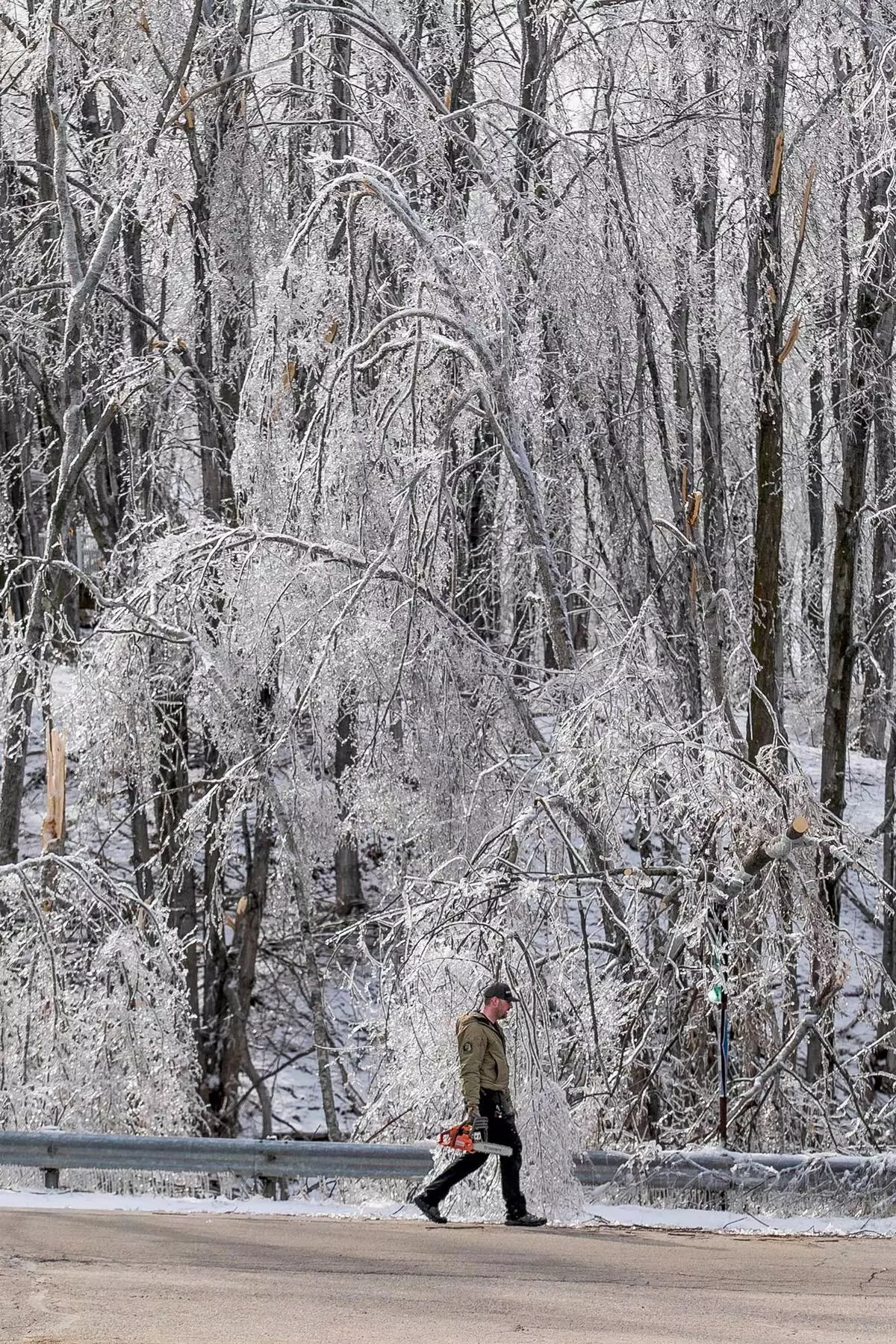
Sgt. Mitch Wallin of the Emmet County Sheriff's Department walks past ice-coated trees as he and Sgt. Tyler Midyett, not pictured, clear branches from along Eppler Road in Petoskey, Mich, Tuesday, April 1, 2025, as cleanup from the weekend's ice storm continues. (Jan-Michael Stump/Traverse City Record-Eagle via AP)
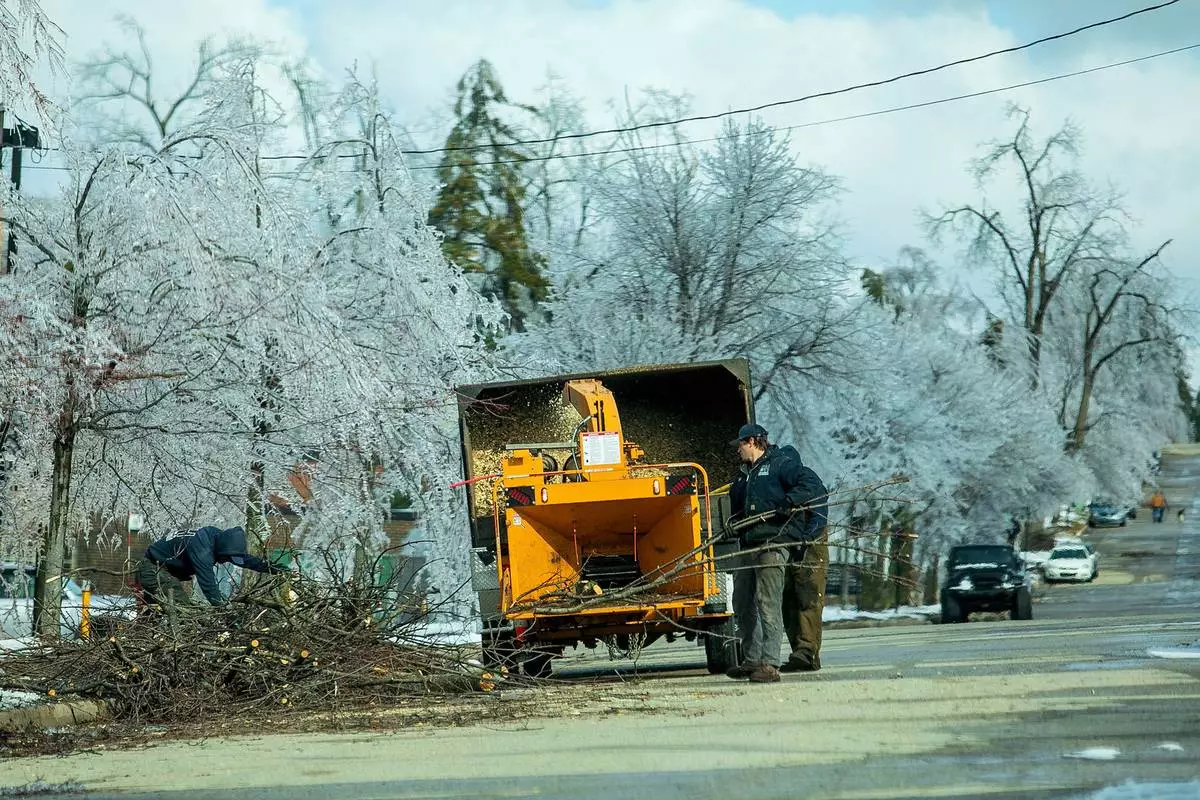
A crew from 5H Irrigation and Maintenance clears downed limbs from yards in Petoskey, Mich., Tuesday, April 1, 2025, as clean up from the weekend's ice storms continues across northern lower Michigan. (Jan-Michael Stump/Traverse City Record-Eagle via AP)
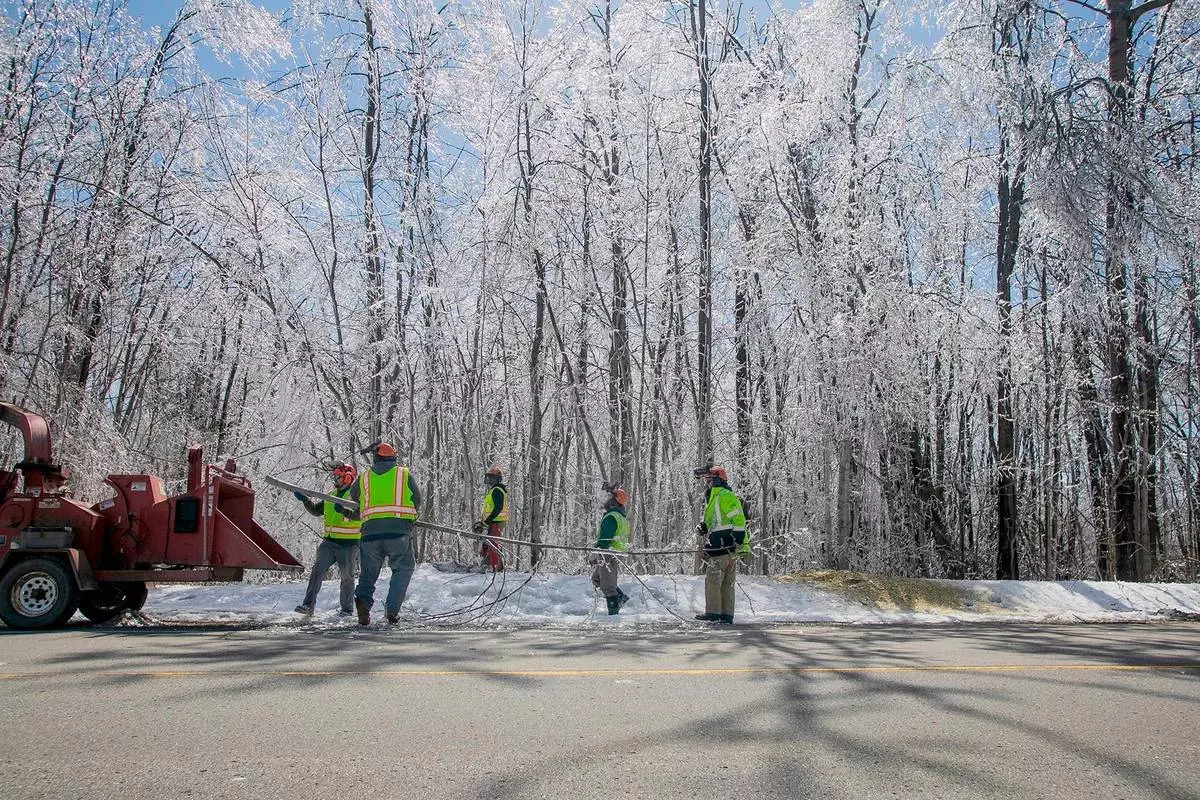
An Antrim County Road Commission crew clears branches and trees hanging near Atwood Road from ice build up Tuesday, April 1, 2025, near Ellsworth, Mich., following weekend storms that deposited as much as one inch of ice over areas of northern lower Michigan. (Jan-Michael Stump/Traverse City Record-Eagle via AP)

Sgt. Tyler Midyett of the Emmet County Sheriff's Department works along with Sgt. Mitch Wallin, not pictured, to clear fallen trees from along Eppler Road in Petoskey, Mich., Tuesday, April 1, 2025, as cleanup from the weekend's ice storm continues. (Jan-Michael Stump/Traverse City Record-Eagle via AP)
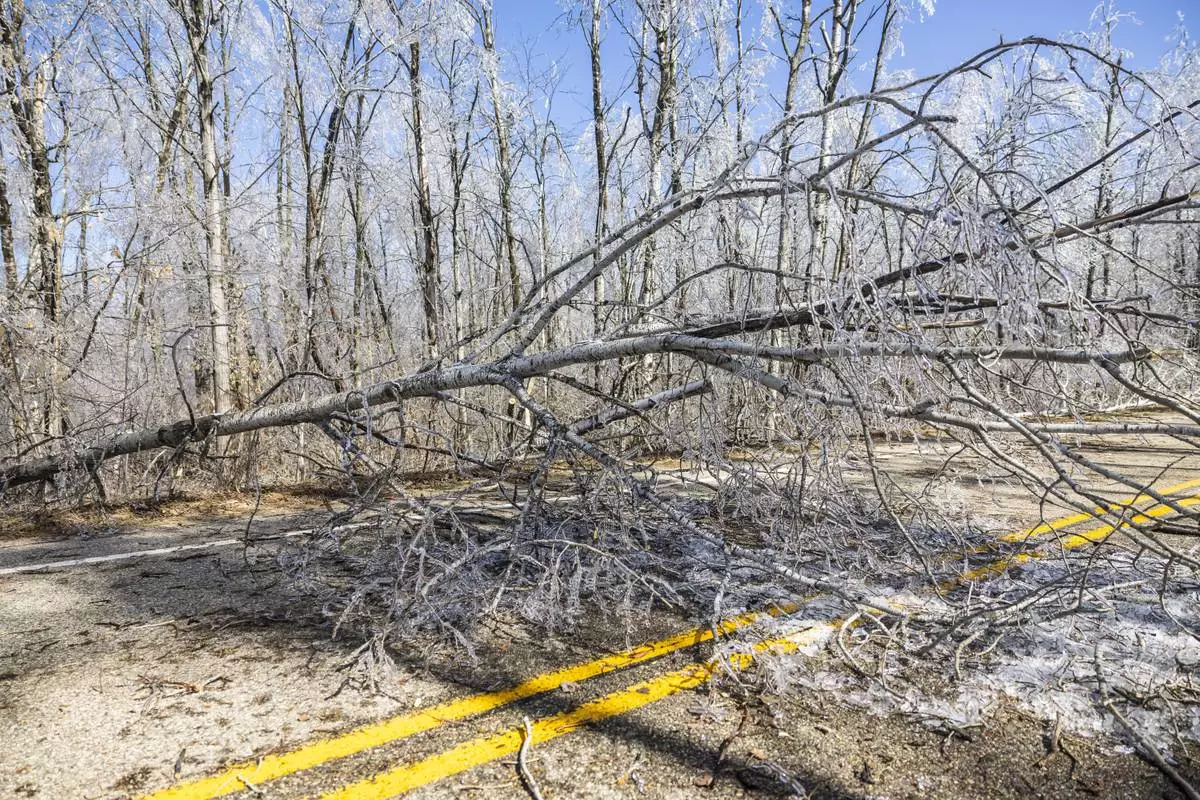
Debris and ice-covered trees cover Curtisville Road that turns into Ausable Valley River Road in Oscoda County, Mich. on Tuesday, April 1, 2025. (Kaytie Boomer /The Bay City Times via AP)
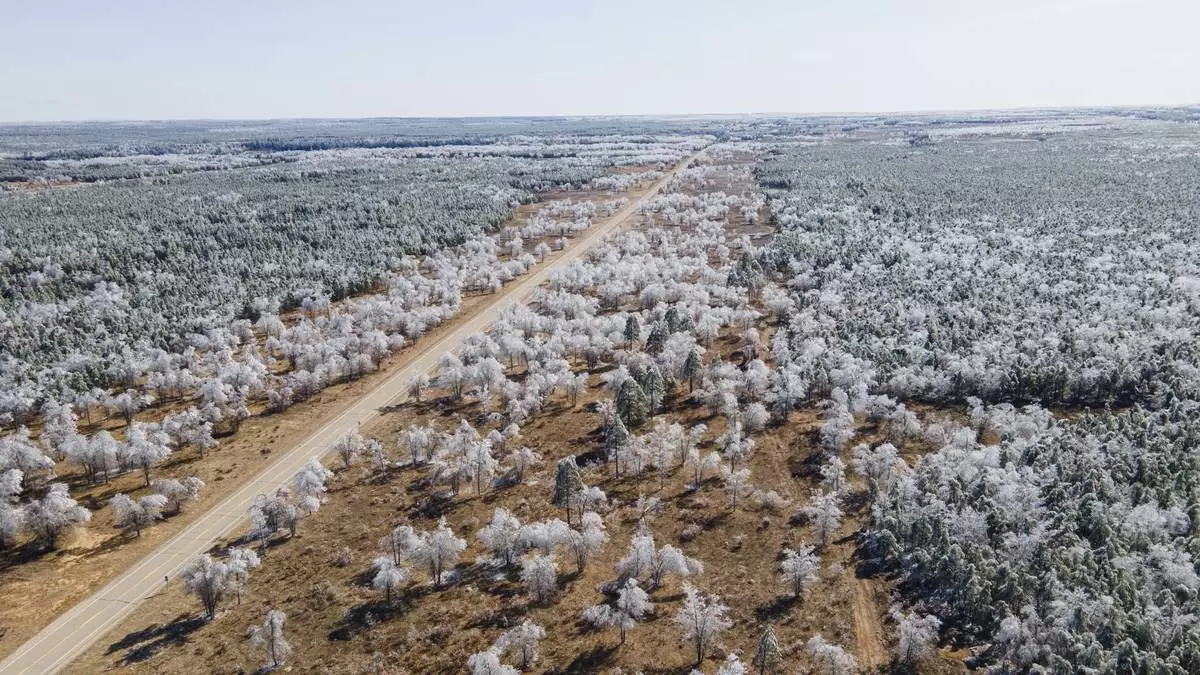
This aerial view shows ice-covered trees off of Eggleston Road and Curtisville Road in Oscoda County, Mich. on Tuesday, April 1, 2025. (Kaytie Boomer /The Bay City Times via AP)
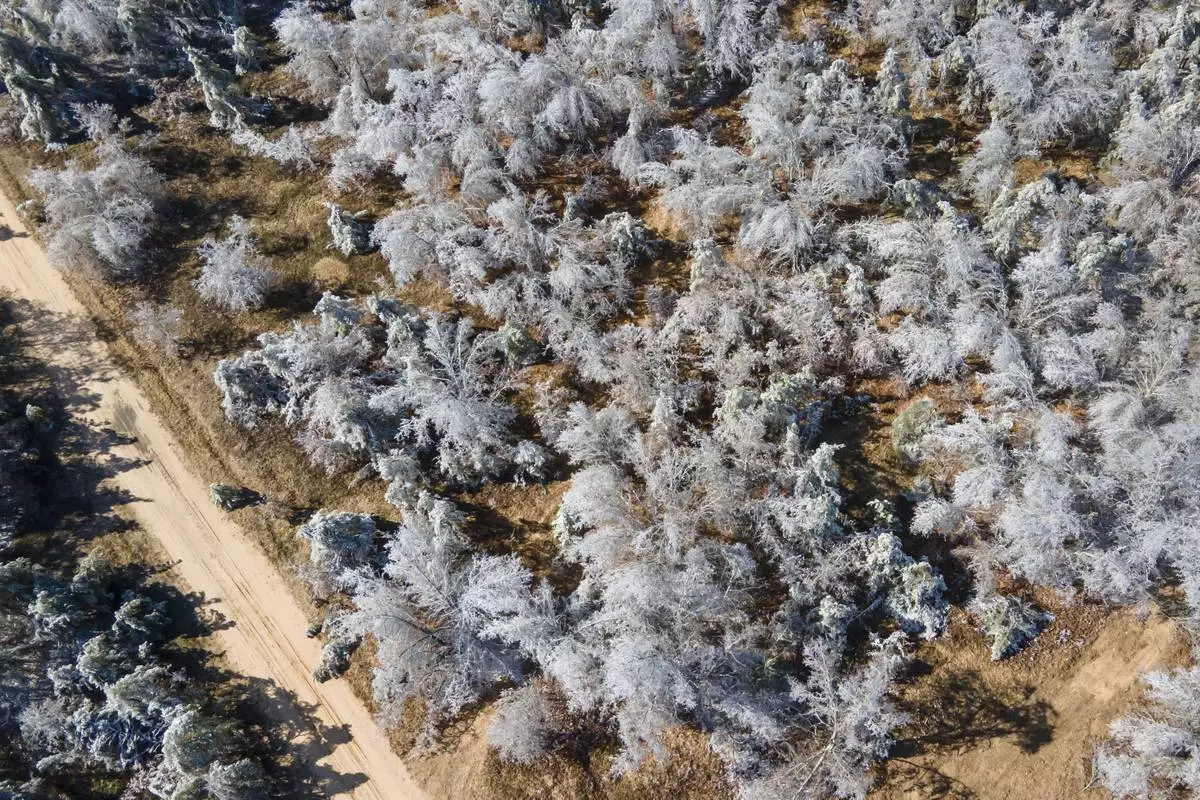
This aerial view shows ice-covered trees off of Eggleston Road and Curtisville Road in Oscoda County, Mich. on Tuesday, April 1, 2025. (Kaytie Boomer /The Bay City Times via AP)
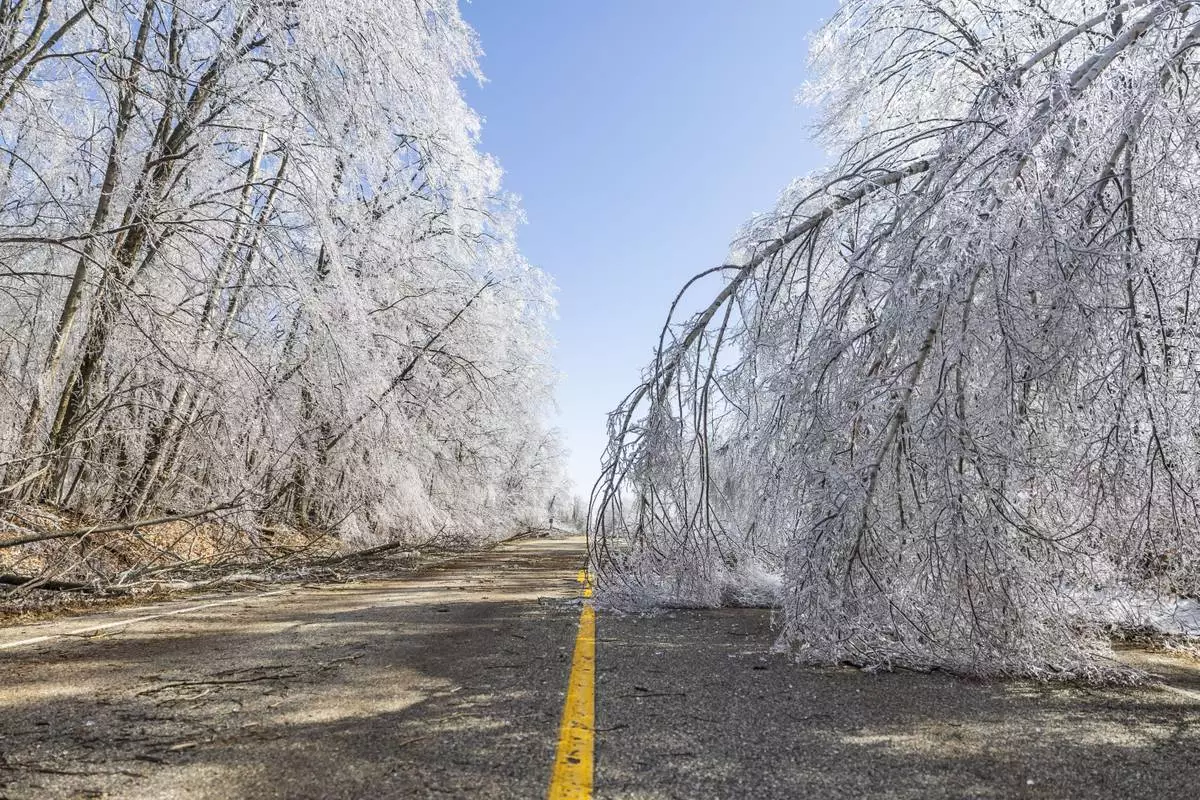
Debris and ice-covered trees cover Curtisville Road that turns into Ausable Valley River Road in Oscoda County, Mich. on Tuesday, April 1, 2025. (Kaytie Boomer /The Bay City Times via AP)
Global markets plunged Monday following last week's two-day meltdown on Wall Street, and President Donald Trump said he won't back down on his sweeping new tariffs, which have roiled global trade.
Countries are scrambling to figure out how to respond to the tariffs, with China and others retaliating quickly.
Trump’s tariff blitz fulfilled a key campaign promise as he acted without Congress to redraw the rules of the international trading system. It was a move decades in the making for Trump, who has long denounced foreign trade deals as unfair to the U.S.
The higher rates are set to be collected beginning Wednesday, ushering in a new era of economic uncertainty with no clear end in sight.
Here's the latest:
China on Monday accused the United States of unilateralism, protectionism and economic bullying with tariffs.
“Putting ‘America First’ over international rules is a typical act of unilateralism, protectionism and economic bullying,” Foreign Affairs spokesperson Lin Jian told reporters.
Last week, Trump put an additional 34% tariff on Chinese goods, on top of two rounds of 10% tariffs already declared in February and March, which Trump said was due to Beijing’s role in the fentanyl crisis. China and other governments retaliated quickly. China announced its own 34% tariff rate on U.S. goods.
Lin said the new tariffs harmed the stability of global production and supply chains and seriously impacted the world’s economic recovery.
“Pressure and threats are not the way to deal with China. China will firmly safeguard its legitimate rights and interests,” Lin added.
European shares dropped in early trading, with Germany’s DAX falling 6.5% to 19,311.29. In Paris, the CAC 40 shed 5.7% to 6,861.27, while Britain’s FTSE 100 lost 4.5% to 7,694.00.
South Korea’s top trade negotiator will visit Washington this week to express Seoul’s concerns over the Trump administration’s increased tariffs and discuss ways to mitigate their negative impact on South Korean businesses.
South Korea’s Ministry of Trade, Industry and Energy said Monday that its minister of trade, Inkyo Cheong, plans to meet with various U.S. officials, including U.S. Trade Representative Jamieson Greer.
The ministry says Cheong aims to gather detailed information on the Trump administration’s trade policies and engage in discussions to reduce the 25% tariffs placed on South Korean products.
Chinese government officials met business representatives from Tesla, GE Healthcare and other U.S. companies on Sunday. It called on them to issue “reasonable” statements and take “concrete actions” on addressing the issue of tariffs.
“The United States in recent days has used all sorts of excuses to announce indiscriminate tariffs on all trading partners, including China, severely harming the rules-based multilateral trade system,” said Ling Ji, a vice minister of commerce, at the meeting with 20 U.S. companies.
“China’s countermeasures are not only a way to protect the rights and interests of companies, including American ones, but are also to urge the U.S. to return to the right path of the multilateral trading system," Ling added.
Ling also promised that China would remain open to foreign investment, according to a readout of the meeting from the Ministry of Commerce.
Malaysia’s Trade Minister Zafrul Abdul Aziz said his country wants to forge a united response from Southeast Asia to the sweeping U.S. tariffs.
Malaysia, which is the chair of the Association of Southeast Asian Nations this year, will lead the regional bloc’s special Economic Ministers’ Meeting on April 10 in Kuala Lumpur to discuss the broader implication of the tariff measures on regional trade and investment, Zafrul told a news conference on Monday.
“We are looking at the investment flow, macroeconomic stability and ASEAN's coordinated response to this tariff issue,” Zafrul said.
ASEAN leaders will also meet to discuss member states’ strategies and to mitigate potential disruptions to regional supply chain networks.
Pakistan plans to send a government delegation to Washington this month to discuss how to avoid the 29% tariffs imposed by the U.S. on imports from Pakistan, officials said Monday.
The development came two days after Pakistan’s prime minister asked its finance minister to send him recommendations for resolving the issue. The U.S. imports around $5 billion worth of textiles and other products from Pakistan, which heavily relies on loans from the International Monetary Fund and others.
The Pakistan Stock Exchange fell rapidly on Monday. The exchange suspended trading for an hour after a 5% drop in its main KSE-30 index.
Middle East stock markets tumbled as they struggled with the dual hit of the new U.S. tariffs and a sharp decline in oil prices, squeezing energy-producing nations that rely on those sales to power their economies and government spending.
Benchmark Brent crude is down by nearly 15% over the last five days of trading, with a barrel of oil costing just over $63. That’s down nearly 30% from a year ago, when a barrel cost over $90.
That cost per barrel is far lower than the estimated break-even price for producers. That’s coupled with the new tariffs, which saw the Gulf Cooperation Council states of Bahrain, Kuwait, Oman, Qatar, Saudi Arabia and the United Arab Emirates hit with 10% tariffs. Other Mideast nations face higher tariffs, like Iraq at 39% and Syria at 41%.
The Dubai Financial Market exchange fell 5% as it opened for the week. The Abu Dhabi Securities Exchange fell 4%.
Markets that opened Sunday saw losses as well. Saudi Arabia’s Tadawul stock exchange fell over 6% in trading. The giant of the exchange, Saudi Arabia’s state-owned oil company Aramco, fell over 5% on its own, wiping away billions in market capitalization for the world’s sixth-most-valuable company.
Beijing struck a note of confidence on Monday even as markets in Hong Kong and Shanghai tumbled.
“The sky won’t fall. Faced with the indiscriminate punches of U.S. taxes, we know what we are doing and we have tools at our disposal," wrote The People's Daily, the Communist Party's official mouthpiece.
China announced a slew of countermeasures on Friday evening aimed at Trump’s tariffs, including its own 34% tariffs on all goods from the U.S. set to go in effect on Wednesday.
The Australian dollar fell below 60 U.S. cents on Monday for the first time since the early months of the COVID-19 pandemic.
The drop reflected concerns over the Chinese economy and market expectations for four interest rate cuts in Australia this calendar year, Australian Treasurer Jim Chalmers said.
“What our modeling shows is that we expect there to be big hits to American growth and Chinese growth and a spike in American inflation as well,” Chalmers said.
“We expect more manageable impacts on the Australian economy, but we still do expect Australian GDP to take a hit and we expect there to be an impact on prices here as well,” he added.
The Trump administration assigned Australia the minimum baseline 10% tariff on imports in the the United States. The U.S. has enjoyed a trade surplus with Australia for decades.
Indian stocks fell sharply on Monday, seeing their biggest single-day drop in percentage terms since March 2020 amid the pandemic.
The benchmark BSE Sensex and the Nifty 50 index both dropped about 5% after trading opened but then recovered slightly. Both were later trading down about 4%.
President Donald Trump said Sunday that he won’t back down on his sweeping tariffs on imports from most of the world unless countries even out their trade with the U.S., digging in on his plans to implement the taxes that have sent financial markets reeling, raised fears of a recession and upended the global trading system.
Speaking to reporters aboard Air Force One, Trump said he didn’t want global markets to fall, but also that he wasn’t concerned about the massive sell-off either, adding, “sometimes you have to take medicine to fix something.”
His comments came as global financial markets appeared on track to continue sharp declines once trading resumes Monday, and after Trump’s aides sought to soothe market concerns by saying more than 50 nations had reached out about launching negotiations to lift the tariffs.
“I spoke to a lot of leaders, European, Asian, from all over the world,” Trump said. “They’re dying to make a deal. And I said, we’re not going to have deficits with your country. We’re not going to do that, because to me a deficit is a loss. We’re going to have surpluses or at worst, going to be breaking even.”
Asian markets plunged on Monday following last week’s two-day meltdown on Wall Street, and U.S. President Donald Trump said he won’t back down on his sweeping tariffs on imports from most of the world unless countries even out their trade with the U.S.
Tokyo’s Nikkei 225 index lost nearly 8% shortly after the market opened on Monday. By midday, it was down 6%. Hong Kong’s Hang Seng dropped 9.4%, while the Shanghai Composite index was down 6.2%, and South Korea’s Kospi lost 4.1%.
U.S. futures also signaled further weakness.
Market observers expect investors will face more wild swings in the days and weeks to come, with a short-term resolution to the trade war appearing unlikely.
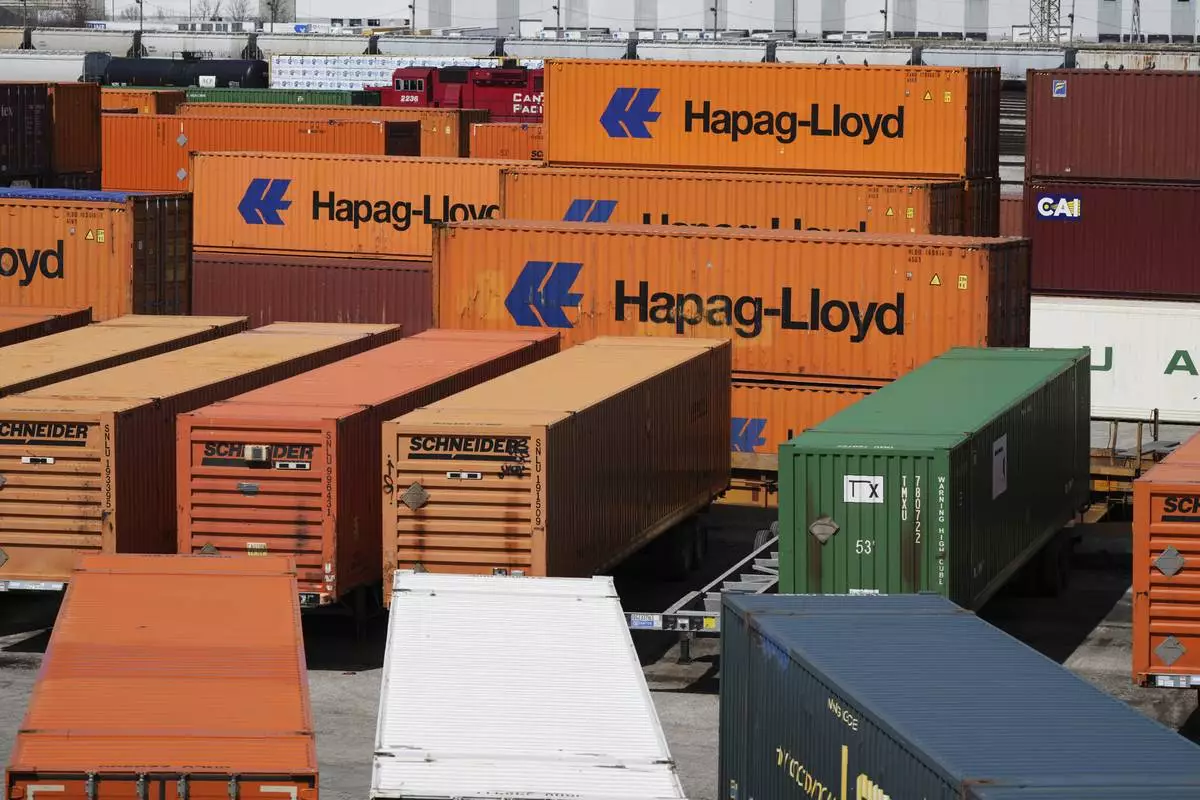
Shipping containers are stored at Bensenville intermodal terminal in Franklin Park, Ill., Sunday, April 6, 2025. (AP Photo/Nam Y. Huh)

Currency traders work near a screen showing the Korea Composite Stock Price Index (KOSPI), top left, and the foreign exchange rate between U.S. dollar and South Korean won, top center, at the foreign exchange dealing room of the KEB Hana Bank headquarters in Seoul, South Korea, Monday, April 7, 2025. (AP Photo/Ahn Young-joon)























